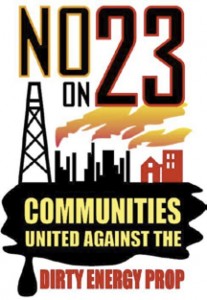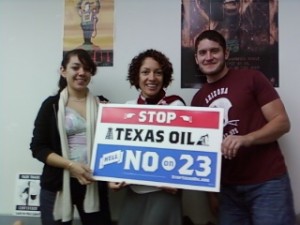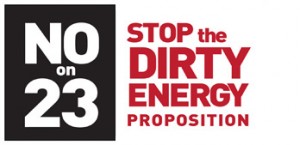NOTE – in February, The Chevron Program at Global Exchange will launch The Chevron Program blog.
Today, Chevron announced that it is shrinking its refining business, including laying off workers. It did not say where or which refinery or refineries would be affected. It will announce the change in March.
Over the past several weeks, Chevron has intensified the buzz around the potential that it could shut down the Richmond, California refinery.
I would not have thought this likely even two months ago. But, as demand has slackened for oil and gas due to the recession, the U.S. has literally become awash in both products and refineries are losing lots of money. Last time this happened, in the 1980’s, it opened the door to a wave of mega mergers in the oil industry, including the shuttering of many refineries. This may well happen again now.
It is also possible that Chevron is simply trying to pressure the plaintiffs in the Richmond lawsuit as it continues with its appeal.
Chevron does not want to face the situation where it is limited in the type of crude it refines in Richmond, even though doing so would increase the health of Richmond and Bay Area residents and reduce the Green House Gas (GHG) footprint of the refinery – the single largest stationary emitter of GHGs in the entire state. The efforts to make the refinery as clean and safe as possible must continue to be supported.
It is critical that we follow this process and ensure that if the refinery does close, that Chevron is required to, at a minimum, fully clean-up the land on which it resides and train its laid off workers. The city must also take part in a transparent public planning effort to focus on clean, healthy, sustainable green jobs and business to replace Chevron.
If it stays open, we must continue the struggle to make it as clean, safe, and transparent as possible.
Two key news articles follow.
Antonia Juhasz
Chevron Program Director
Global Exchange
http://www.GlobalExchange.org/chevron
http://www.latimes.com/business/la-fi-chevron20-2010jan20,0,431071.story
Chevron to shrink refining business
Associated Press
January 19, 2010 | 10:34 a.m.
NEW YORK — Chevron Corp. said today it plans to shrink its refining business in a move that will cut jobs throughout the company.
Chevron hasn’t yet decided how many of its employees will be affected and whether the cuts will be concentrated in the U.S. A spokesman said the company is reviewing its entire downstream operation and will announce more details about how it plans to reorganize in March.
Chevron’s refining business will be “a less complex and smaller organization that will require fewer positions,” spokesman Lloyd Avram said.
Petroleum refineries have struggled to make money as oil prices doubled from early 2009 while demand for gasoline and jet fuel dropped. Independent refiners shuttered some of their operations last year, and others are running at the lowest levels since 1991.
Chevron, the second-largest U.S. oil company, has warned investors that profits will shrink in the fourth quarter, primarily because of its refining business.
According to an interim report released earlier this month, Chevron said fourth-quarter profit margins were about 39 percent lower than last year for its Gulf Coast refineries. They were 59 percent lower in Singapore and 45 percent lower in Europe.
Avram said the company hasn’t decided when to announce job cuts. However, changes to the company’s refining business are expected to be in place by the third quarter, he said.
Chevron shares gave up 6 cents at $79.17 in Tuesday trading.
Copyright © 2010, The Los Angeles Times
http://money.cnn.com/news/newsfeeds/articles/djf500/201001191140DOWJONESDJONLINE000333_FORTUNE5.htm
UPDATE: Chevron Lays Off Workers As Part Of Downstream Restructuring
Dow Jones
January 19, 2010: 11:40 AM ET
(Adds analyst comments and background)
By Isabel Ordonez
Of DOW JONES NEWSWIRES
HOUSTON -(Dow Jones)- Chevron Corp. (CVX) said Tuesday it is going to eliminate an unspecified number of jobs as part of a review of its global marketing and refining operations that will result in a smaller business.
Employees of Chevron’s downstream operations, which manufacture, transport and sell gasoline, diesel fuel and other refined products, had been notified of the decision Monday, spokesman Lloyd Avram told Dow Jones Newswires.
“The new organization will ensure that our downstream business remains competitive well into the future,” he said.
The San Ramon, Calf.-based company said it has not yet decided how many people will be laid off, but that the changes will take place by the third quarter. The restructuring will include exiting some markets, the company said without providing details.
The move comes as the downstream business has become much less profitable than it has been in recent years due to weak demand for fuel. Chevron warned investors last week in its interim update that it expects its fourth-quarter earnings to be lower than the previous quarter, driven by a “sharp” decline in profits from its refining and marketing business.
“This restructuring is not surprising because Chevron’s downstream business is an area that has been struggling from a profitability stand point,” said Jason Gammel, analysts at Macquarie Research. “It’s not just Chevron, it’s the whole industry.”
The entire energy sector has been dealing with the effects of slackening demand for fuel caused by the global economic downturn. The refining sector has been especially hard hit and several plants were idled or indefinitely closed in 2009.
Valero Energy Corp. (VLO), the largest independent refiner in North America, closed a major gasoline refinery in Delaware in November and laid off 550 workers. Sunoco Inc. (SUN) also shut down its Eagle Point refinery in Westville, N.J., last year and furloughed 400 workers in October last year in response to a poor operating environment.
Chevron’s move is the last in a series of changes to its refining and marketing operations. In December, Chevron said it will stop supplying more than a thousand independently owned filling stations in the eastern U.S. a moved that followed the company’s exit last year from marketing operations in Brazil and various countries in Africa. The company has also said in the past that the reviewing of its global downstream operations could include the closure of its Hawaii refinery.
Last month, Chevron said its 2010 capital budget will be $21.6 billion, 5% lower than its 2009 budget, as it focuses on exploration and development of oil and natural gas at the expense of refining.
Other major oil companies have engaged in major transformations in order to face the economic downturn. Houston-based ConocoPhillips said in October it will sell approximately $10 billion worth of assets over the next two years. In early 2009, the company cut its capital spending and laid off lay off thousands of workers. Royal Dutch Shell Plc (RDSA) last year also said it would lay off 5, 000 people to cope with the difficult economic environment.
Chevron is the second-largest U.S. oil company by market value after Exxon Mobil Corp. (XOM).
-By Isabel Ordonez, Dow Jones Newswires; 713-547-9207; isabel.ordonez@ dowjones.com (Angel Gonzalez and Susan Daker in Houston contributed to this report.)
(END) Dow Jones Newswires
01-19-10 1140ET
Copyright (c) 2010 Dow Jones & Company, Inc.
=====================
Antonia Juhasz
Director
The Chevron Program
Global Exchange
415-575-5545
www.globalexchange.org/chevron
2017 Mission Street, 2nd Floor
San Francisco, CA 94110
http://www.Twitter.com/ChevronProgram
 Big polluters, Koch Industries and Texas oil companies Valero and Tesoro, are spending millions promoting a deceptive initiative on California’s ballot, Proposition 23, trying to kill the state’s Global Warming Solutions Act. A recent editorial in the Sacramento Bee stated “If Proposition 23 were to pass on Nov. 2, it would be a major setback to state, national and international efforts to fight global warming.”
Big polluters, Koch Industries and Texas oil companies Valero and Tesoro, are spending millions promoting a deceptive initiative on California’s ballot, Proposition 23, trying to kill the state’s Global Warming Solutions Act. A recent editorial in the Sacramento Bee stated “If Proposition 23 were to pass on Nov. 2, it would be a major setback to state, national and international efforts to fight global warming.”







